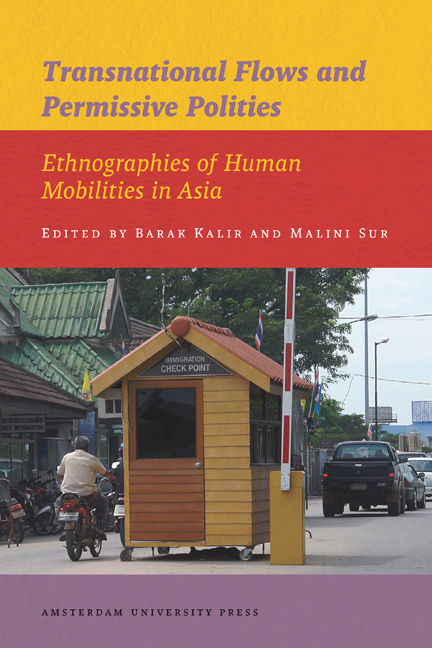Book contents
- Frontmatter
- Contents
- List of Tables, Maps, Figures and Photographs
- Acknowledgements
- Introduction: Mobile Practices and Regimes of Permissiveness
- 1 Illegality Rules: Chinese Migrant Workers Caught up in the Illegal but Licit Operations of Labour Migration Regimes
- 2 Contesting the State of Exception in the Afghan-Pakistani Marchlands
- 3 ‘Looking for a Life’: Rohingya Refugee Migration in the Post-Imperial Age
- 4 Smuggling Cultures in the Indonesia-Singapore Borderlands
- 5 Trade, Transnationalism and Ethnic Infighting: Borders of Authority in Northeast Borneo
- 6 Bamboo Baskets and Barricades: Gendered Landscapes at the India-Bangladesh Border
- 7 Moving between Kerala and Dubai: Women Domestic Workers, State Actors and the Misrecognition of Problems
- 8 Emigration of Female Domestic Workers from Kerala: Gender, State Policy and the Politics of Movement
- 9 Mainland Chinese Migrants in Taiwan, 1895-1945: The Drawbacks of Being Legal
- 10 ‘Playing Edge Ball’: Transnational Migration Brokerage in China
- Epilogue: Irregular Mobilities and Disjunctive Moralities
- About the Editors and Contributors
- Bibliography
- Index
- Publications Series
4 - Smuggling Cultures in the Indonesia-Singapore Borderlands
Published online by Cambridge University Press: 15 January 2021
- Frontmatter
- Contents
- List of Tables, Maps, Figures and Photographs
- Acknowledgements
- Introduction: Mobile Practices and Regimes of Permissiveness
- 1 Illegality Rules: Chinese Migrant Workers Caught up in the Illegal but Licit Operations of Labour Migration Regimes
- 2 Contesting the State of Exception in the Afghan-Pakistani Marchlands
- 3 ‘Looking for a Life’: Rohingya Refugee Migration in the Post-Imperial Age
- 4 Smuggling Cultures in the Indonesia-Singapore Borderlands
- 5 Trade, Transnationalism and Ethnic Infighting: Borders of Authority in Northeast Borneo
- 6 Bamboo Baskets and Barricades: Gendered Landscapes at the India-Bangladesh Border
- 7 Moving between Kerala and Dubai: Women Domestic Workers, State Actors and the Misrecognition of Problems
- 8 Emigration of Female Domestic Workers from Kerala: Gender, State Policy and the Politics of Movement
- 9 Mainland Chinese Migrants in Taiwan, 1895-1945: The Drawbacks of Being Legal
- 10 ‘Playing Edge Ball’: Transnational Migration Brokerage in China
- Epilogue: Irregular Mobilities and Disjunctive Moralities
- About the Editors and Contributors
- Bibliography
- Index
- Publications Series
Summary
The smuggling will never stop. As long as seawater is still seawater and as long as the sea still has water in it, smuggling will continue in the Riau Islands.
Tengku Umar, owner of an import-export businessBorders are lucrative zones of exchange and trade, much of it clandestine. Smuggling, by definition, ‘depends on the presence of a border, and on what the state declares can be legally imported or exported’ (Donnan & Wilson 1999: 101), and while free trade zones and growth triangles welcome the free movement of goods and services, border regions can also become heightened areas of state control that provide an environment in which smuggling thrives. Donnan and Wilson (1999: 88) argue that acts of smuggling are a form of subversion or resistance to the existence of the border, and therefore the state. However, there is not always a conflict of interest and struggle between state authorities and smugglers (Megoran, Raballand, & Bouyjou 2005). Synergies between the formal and informal economies ensure that illegal cross-border trade does not operate independently of systems of formal regulatory authority. Smugglers are frequently subject to a system of unofficial ‘rules of law’ developed through tacit agreement among trading parties, which operates in parallel to regulations imposed by the state (cf. Chang 2004; Walker 1999). The existence of these parallel regulatory systems creates a situation where smuggling can constitute a form of informal power in opposition to state power while at the same time being integrated into state apparatuses. Indeed, studies of smuggling demonstrate that collusion by state authorities is almost always essential for illegal cross-border trade to occur (Chang 2004; Niger- Thomas 2001; Van Schendel 1993). Like many other forms of illicit cross-border exchange, smuggling thus reveals the paradox of the border: even as illegal cross-border trade works to undermine the state, it also works to constitute it (Donnan & Wilson 1999: 106).
In this chapter, we examine the unauthorised movement of goods across the border to and from Indonesia's Riau Islands from the perspective of the individuals who smuggle and consume them, and from the perspective of local agents of the state – individuals whose stories demonstrate the multiple meanings associated with cross-border flows across the straits and, in doing so, shed light on how state practices intersect with competing ideas about legality and licitness.
- Type
- Chapter
- Information
- Transnational Flows and Permissive PolitiesEthnographies of Human Mobilities in Asia, pp. 91 - 108Publisher: Amsterdam University PressPrint publication year: 2012
- 2
- Cited by

